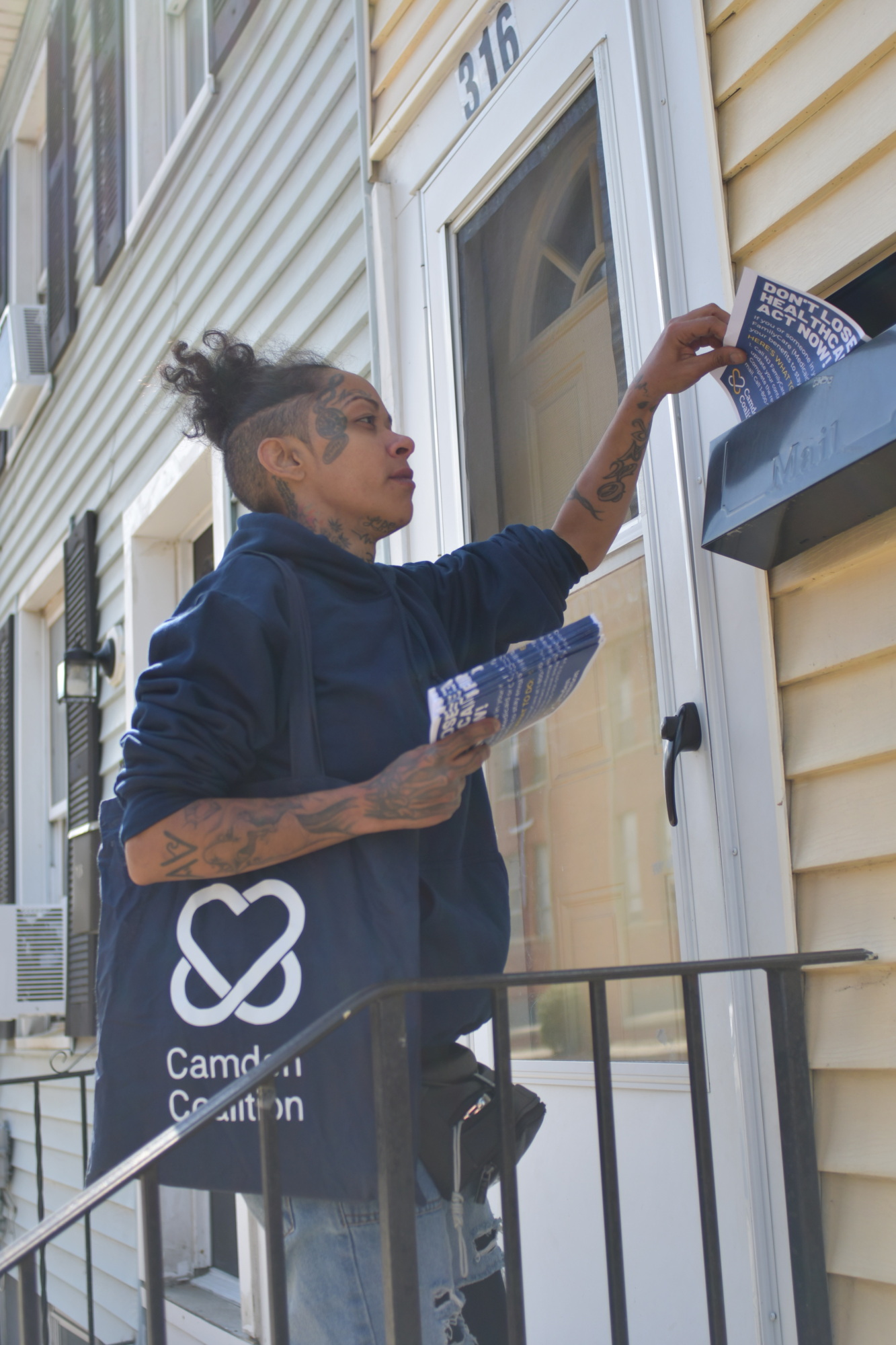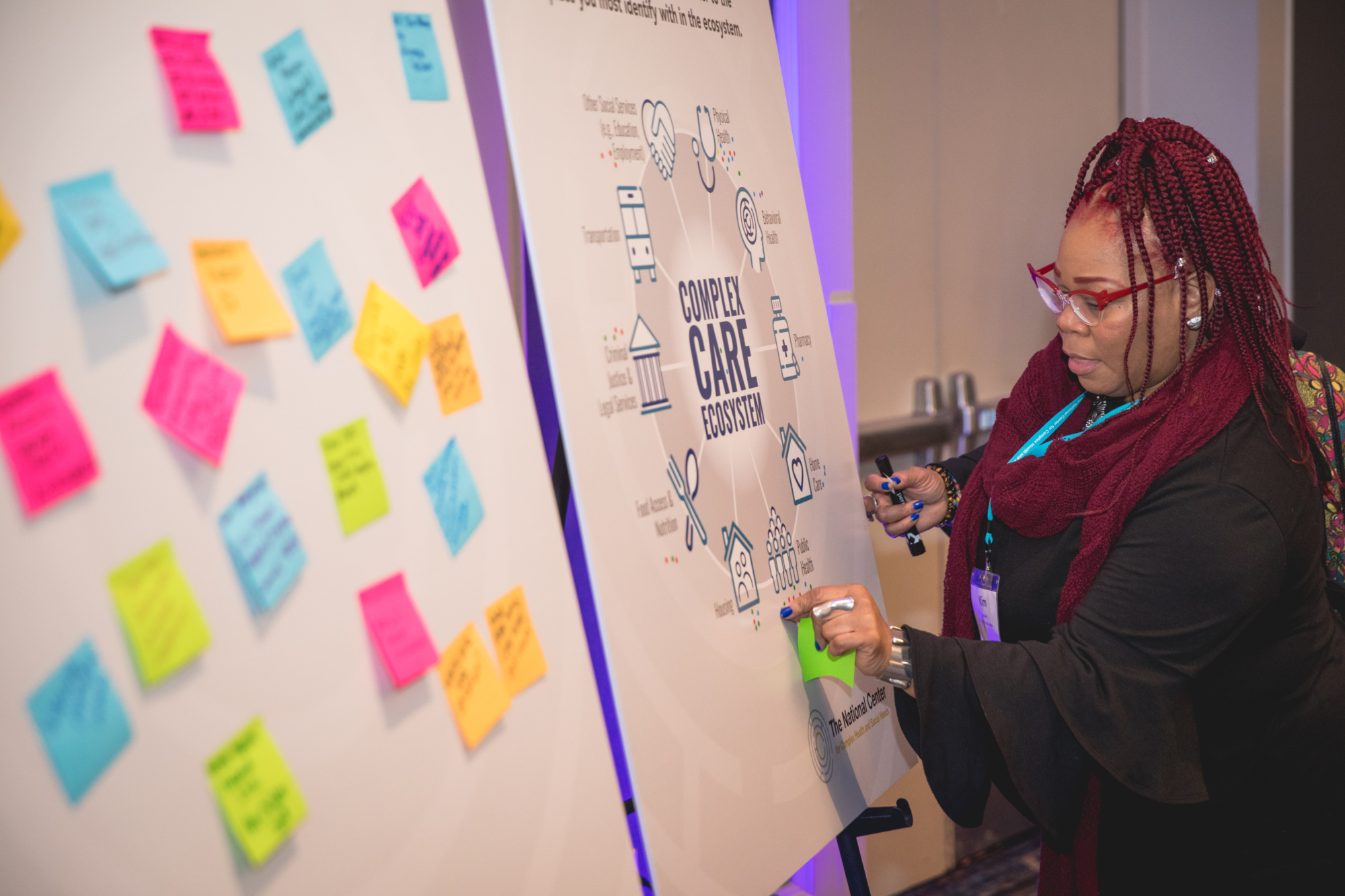
Measuring our impact: Strengthening ecosystems of care in Camden and beyond
Community & consumer engagement Data analysis & integration Strengthening ecosystems of care
Community & consumer engagement Strengthening ecosystems of care Public benefits SDOH & health equity

In March 2020, the Families First Coronavirus Response Act paused the annual reenrollment process in Medicaid. With the end of this continuous enrollment provision in April 2023, Medicaid beneficiaries across the country have had to reenroll in the program to retain their coverage. This process of redetermining who is eligible for Medicaid — after three years of people changing addresses and jobs — is a huge undertaking for every state.
In New Jersey, the Camden Coalition and our three fellow Regional Health Hubs (RHHs) across the state have taken the lead in following up with Medicaid members that haven’t yet completed their renewal paperwork and raising awareness of the process in our communities.
This massive undertaking has required close collaboration with state agencies and with our partners across South Jersey. It has also been an opportunity to put our framework for strengthening community-based ecosystems of care into practice. We’ve seen the real-time impact of shared data, responsive leadership, and ongoing community engagement — and the infrastructure we put into place to facilitate collaboration during the COVID pandemic.
Each month, each of New Jersey’s four Regional Health Hubs, including the Camden Coalition, receive a list of Medicaid beneficiaries in their region who have not yet completed their renewal paperwork or responded to communications from the state. Our staff reaches out by phone to each person, making sure they received their paperwork and connecting them back to the state or to their county Board of Social Services to prevent any gaps in coverage.
Since April, our team has made 32,000 outreach calls, and 62,000 calls have been made statewide.
Part of why we and our fellow RHHs have been able to make so many calls is our access to shared data. New Jersey’s Medicaid office’s contact information for its members is limited: phone numbers connected with members’ names may be out-of-date, and sometimes no phone number exists at all. To ensure that additional measures are being taken to reach families most at risk of disenrollment, our team members cross-reference members’ names in the Camden Coalition Health Information Exchange (HIE) and pull contact information from their linked health records.
“This work highlights data-quality issues that are boring to talk about but are really important,” says Audrey Hendricks, Senior Program Manager for Data-Driven Workflows, “like the consequences of a misspelled name or an old phone number.”
The Camden Coalition HIE is also being used statewide to record the outcomes of outreach calls. “What’s been really exciting is how quickly we were able to leverage the Camden Coalition HIE as a shared platform across the whole state,” says Natasha Dravid, Senior Director of Care Management and Clinical Redesign Initiatives. “Within about two weeks, our HIE team created a form with input from the other Regional Health Hubs that allows us to collect data consistently so that we can see how we’re doing across four of the most impacted communities in New Jersey.”
Strong ecosystems of care need a well-functioning process and structure for identifying priorities, improving services, and collaborating with all relevant stakeholders. For Medicaid redetermination — as was the case during the COVID pandemic — it is crucial that our outreach is efficient and our messaging is aligned.
At the height of the COVID pandemic, the core partners coordinating the response in Camden came together for a weekly “micro-summit” meeting to discuss priorities and access to resources. Now that Medicaid redetermination is underway, we’ve revived the micro-summit, now bi-weekly. Joining the original micro-summit members — Camden Coalition, Camden County Department of Health and Human Services, Cooper University Health Care, Virtua Health, the Southern New Jersey Perinatal Cooperative, and Volunteers of America — for this go around are the Camden County Board of Social Services and the Center for Family Services (CFS), both of whom have extensive expertise in helping community members navigate public benefits.
“Right now, the micro-summit meetings are focused on figuring out a regional Camden strategy to reach people who are at risk of losing their coverage,” says Shelby Kehoe, Senior Program Manager for Community Engagement and Capacity Building. “We need to make sure that the key messaging about how to complete the Medicaid renewal process and where to go for help is getting out there. Part of that is figuring out what messaging is needed in different settings, like hospitals, social service agencies, and schools.”
“We’ve learned that we need to be quite thoughtful about what the messaging looks like at different points throughout an initiative,” says Victor Murray, Senior Director of Community Engagement and Capacity Building. “It’s important to be precise and up-to-date as new information comes out and as the environment and circumstances change, so we’re not continuing to beat the same drum. At the start of the redetermination process, the messaging was for Medicaid members to make sure their information is up-to-date. What is the messaging now? That’s what we’re figuring out together.”
“It’s devastating for someone who has had insurance for so long to suddenly lose it,” says Community Health Worker Anna Muniz.
Unfortunately, people are starting to lose coverage, says Shelby, particularly those right on the edge of the benefits cliff. “The redetermination process is just getting underway and people are just starting to understand its full impact,” she says. “August was the first month that people were removed from New Jersey Medicaid for non-response.”
New Jersey’s Medicaid program is called NJ FamilyCare, and as the name suggests, a large proportion of those covered are children and parents: one in three children in NJ is covered by Medicaid. We have been working closely with the Camden City School District to help families stay covered, including by training the district’s Family Operations Coordinators and organizing a learning session for families on the redetermination process.
Our Community Ambassadors have been relentlessly raising awareness of Medicaid redetermination in their neighborhoods and at community events. At one community event, a resident approached our team, worried that she would lose her coverage and concerned that she hadn’t received a packet in the mail. “She had been unable to reach New Jersey Medicaid,” Shelby says. “We were able to elevate her case to the state’s rapid response team, who called her and helped her figure everything out. Our location within the community allows us to be a trusted messenger when people are confused or information is unclear.”
For us, the Regional Health Hub model is a key mechanism to formalize our South Jersey ecosystem of care and demonstrate how a working ecosystem enables a healthier community. But the model has major benefits for state agency leaders and policymakers as well.
“From a state policy perspective, it’s helpful to build programming with enough flexibility to take on different streams of work and challenges as they come up,” says Victor. “If your infrastructure is confined to a particular disease or particular population, you’re restricted in the work you can do.”
With the advent of the COVID pandemic two months after the model was signed into law, RHHs quickly proved their value as nimble, community-based assets with the ability to collaboratively tackle unprecedented challenges. As the state’s focus has shifted from COVID to Medicaid redetermination, this unique model has another opportunity to shine.
“The Regional Health Hub model allowed us to collaborate during COVID, and now Medicaid redetermination is the issue of the day,” says Shelby. “There will be something else next year. But this infrastructure will allow us to continue to support the state’s priorities and serve the people we work with here in Camden and across the state.”
Community & consumer engagement Data analysis & integration Strengthening ecosystems of care
Community & consumer engagement Strengthening ecosystems of care
By Rebecca Koppel, Senior Program Manager for Field Building and Resources
Building the complex care field Strengthening ecosystems of care Quality improvement SDOH & health equity
Strengthening ecosystems of care COVID response Funding & financing Policy & advocacy Public benefits Quality improvement






